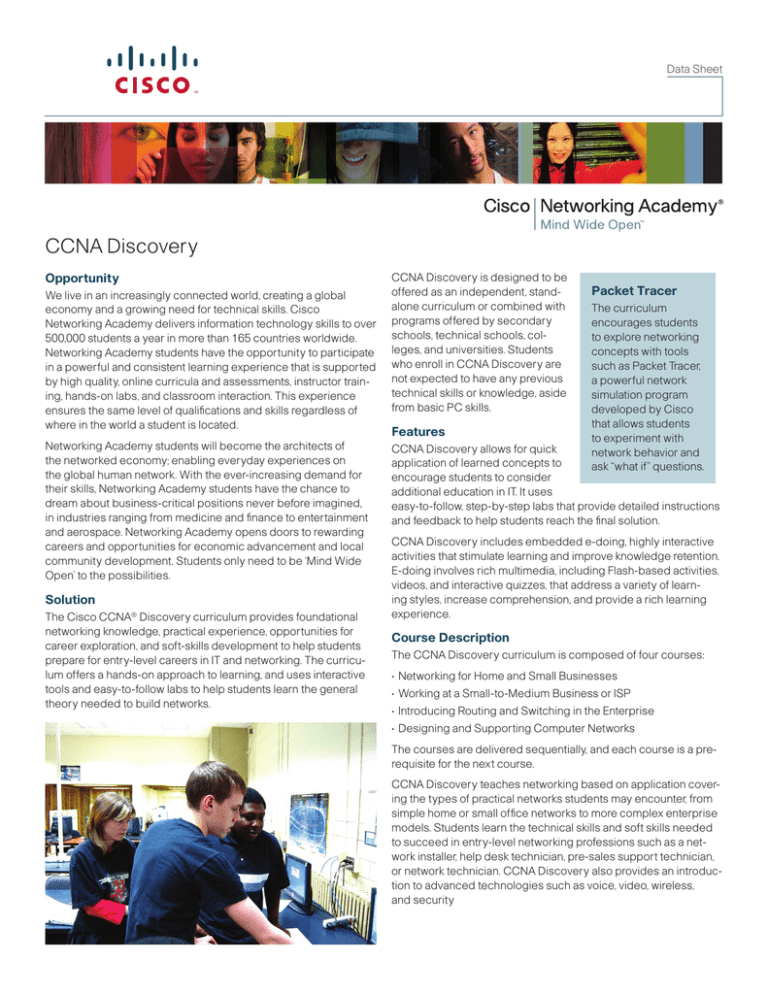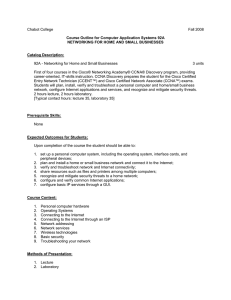
Data Sheet
CCNA Discovery
Opportunity
We live in an increasingly connected world, creating a global
economy and a growing need for technical skills. Cisco
­Networking Academy delivers information technology skills to over
500,000 students a year in more than 165 countries worldwide.
Networking Academy students have the opportunity to participate
in a powerful and consistent learning experience that is supported
by high quality, online curricula and assessments, instructor training, hands-on labs, and classroom interaction. This experience
ensures the same level of qualifications and skills regardless of
where in the world a student is located.
Networking Academy students will become the architects of
the networked economy; enabling everyday experiences on
the global human network. With the ever-increasing demand for
their skills, Networking Academy students have the chance to
dream about business-critical positions never before imagined,
in industries ranging from medicine and finance to entertainment
and aerospace. Networking Academy opens doors to rewarding
careers and opportunities for economic advancement and local
community development. Students only need to be ‘Mind Wide
Open’ to the possibilities.
Solution
The Cisco CCNA® Discovery curriculum provides foundational
networking knowledge, practical experience, opportunities for
career exploration, and soft-skills development to help students
prepare for entry-level careers in IT and networking. The curriculum offers a hands-on approach to learning, and uses interactive
tools and easy-to-follow labs to help students learn the general
theory needed to build networks.
CCNA Discovery is designed to be
offered as an independent, standalone curriculum or combined with
programs offered by secondary
schools, technical schools, colleges, and universities. Students
who enroll in CCNA Discovery are
not expected to have any previous
technical skills or knowledge, aside
from basic PC skills.
Features
Packet Tracer
The curriculum
encourages students
to explore networking
concepts with tools
such as Packet Tracer,
a powerful network
simulation program
developed by Cisco
that a
­ llows students
to experiment with
network behavior and
ask “what if” questions.
CCNA Discovery allows for quick
application of learned concepts to
encourage students to consider
additional education in IT. It uses
easy-to-follow, step-by-step labs that provide detailed instructions
and feedback to help students reach the final solution.
CCNA Discovery includes embedded e-doing, highly interactive
activities that stimulate learning and improve knowledge retention.
E-doing involves rich multimedia, i­ncluding Flash-based activities,
videos, and interactive quizzes, that address a variety of learning styles, increase comprehension, and provide a rich learning
experience.
Course Description
The CCNA Discovery curriculum is composed of four courses:
• Networking for Home and Small Businesses
• Working at a Small-to-Medium Business or ISP
• Introducing Routing and Switching in the Enterprise
• Designing and Supporting Computer Networks
The courses are delivered sequentially, and each course is a prerequisite for the next course.
CCNA Discovery teaches networking based on application covering the types of practical networks students may encounter, from
simple home or small office networks to more complex enterprise
models. Students learn the technical skills and soft skills needed
to succeed in entry-level networking professions such as a network installer, help desk technician, pre-sales support technician,
or network technician. CCNA Discovery also provides an introduction to advanced technologies such as voice, video, wireless,
and security
Data Sheet
Skills and Competencies
Here are some examples of the skills students will be able to perform after completing
each course:
Networking for Home and Small
Businesses
Working at a Small-to-Medium Business
or ISP
Set up a personal computer system, including
the operating system, interface cards, and
peripheral devices
Understand the structure of the Internet and
how communication occurs between hosts
Plan and install a small network connecting to
the Internet
Install, configure, and troubleshoot Cisco IOS
devices
Troubleshoot network and Internet
connectivity
Plan a basic wired infrastructure to support
network traffic
The CCNA Discovery curriculum prepares
students for two different Cisco certification exams, CCENT® or CCNA®. After
completing the Networking for Home and
Small Businesses and Working at a Smallto-Medium Business or ISP courses, a student can choose to complete the CCENT®
certification (Cisco Certified Entry Network
Technician) certification exam. CCENT
certifies that students have developed
the practical skills required for entry-level
networking support positions. In addition,
this certification is designed to assess a
student’s aptitude and competence for
working with Cisco routers, switches and
Cisco IOS™.
Share resources such as files and printers
among multiple computers
Configure a server to share resources and
provide common Web services
Recognize and mitigate security threats to a
home network
Implement basic WAN connectivity using
Telco services
Configure an integrated wireless access point
and wireless client
Demonstrate proper disaster-recovery
procedures and perform server backups
Introducing Routing and Switching in
the Enterprise
Designing and Supporting Computer
Networks
Implement a LAN for an approved network
design
Gather customer requirements
Configure a switch with VLANs and interswitch communication
Design a simple Internetwork using Cisco
technology
Implement access lists to permit or deny
specific traffic
Design an IP addressing scheme to meet LAN
requirements
Implement WAN links
Create an equipment list to meet LAN design
requirements
Configure routing protocols on Cisco devices
Install and configure a prototype Internetwork
CCENT is an optional first step toward
earning the Cisco CCNA® network
­associate certification, which is the
foundational certification for networking
careers. Students who complete all four
CCNA Discovery courses will be prepared
for the industry-standard CCNA certification exam.
Perform LAN, WAN, and VLAN troubleshooting
using a structured methodology and the
OSI model
Obtain and upgrade Cisco IOS software in
Cisco devices
Industry Recognized Certification
For more information
Cisco Networking Academy Program
www.cisco.com/go/netacad
Locate a Networking Academy
www.cisco.com/edu/locate
Course Catalog
www.cisco.com/edu/courses
Certifications
www.cisco.com/go/certifications
Americas Headquarters
Cisco Systems, Inc.
170 West Tasman Drive
San Jose, CA 95134-1706
USA
www.cisco.com
Tel: 408 526-4000
800 553-NETS (6387)
Fax: 408 527-0883
Asia Pacific Headquarters
Cisco Systems, Inc.
168 Robinson Road
#28-01 Capital Tower
Singapore 068912
www.cisco.com
Tel: +65 6317 7777
Fax: +65 6317 7799
Europe Headquarters
Cisco Systems International BV
Haarlerbergpark
Haarlerbergweg 13-19
1101 CH Amsterdam
The Netherlands
www-europe.cisco.com
Tel: +31 0 800 020 0791
Fax: +31 0 20 357 1100
Cisco has more than 200 offices worldwide. Addresses, phone numbers, and fax numbers are listed on the Cisco Website at www.cisco.com/go/offices.
©2007 Cisco Systems, Inc. All rights reserved. CCVP, the Cisco logo, and the Cisco Square Bridge logo are trademarks of Cisco Systems, Inc.; Changing the Way We Work, Live, Play, and Learn is a service mark of Cisco
Systems, Inc.; and Access Registrar, Aironet, BPX, Catalyst, CCDA, CCDP, CCIE, CCIP, CCNA, CCNP, CCSP, Cisco, the Cisco Certified Internetwork Expert logo, Cisco IOS, Cisco Press, Cisco Systems, Cisco Systems
Capital, the Cisco Systems logo, Cisco Unity, Enterprise/Solver, EtherChannel, EtherFast, EtherSwitch, Fast Step, Follow Me Browsing, FormShare, GigaDrive, HomeLink, Internet Quotient, IOS, iPhone, IP/TV, iQ Expertise, the iQ
logo, iQ Net Readiness Scorecard, iQuick Study, LightStream, Linksys, MeetingPlace, MGX, Networking Academy, Network Registrar, Packet, PIX, ProConnect, ScriptShare, SMARTnet, StackWise, The Fastest Way to Increase
Your Internet Quotient, and TransPath are registered trademarks of Cisco Systems, Inc. and/or its affiliates in the United States and certain other countries..
All other trademarks mentioned in this document or Website are the property of their respective owners. The use of the word partner does not imply a partnership relationship between Cisco and any other company. (0705R)


